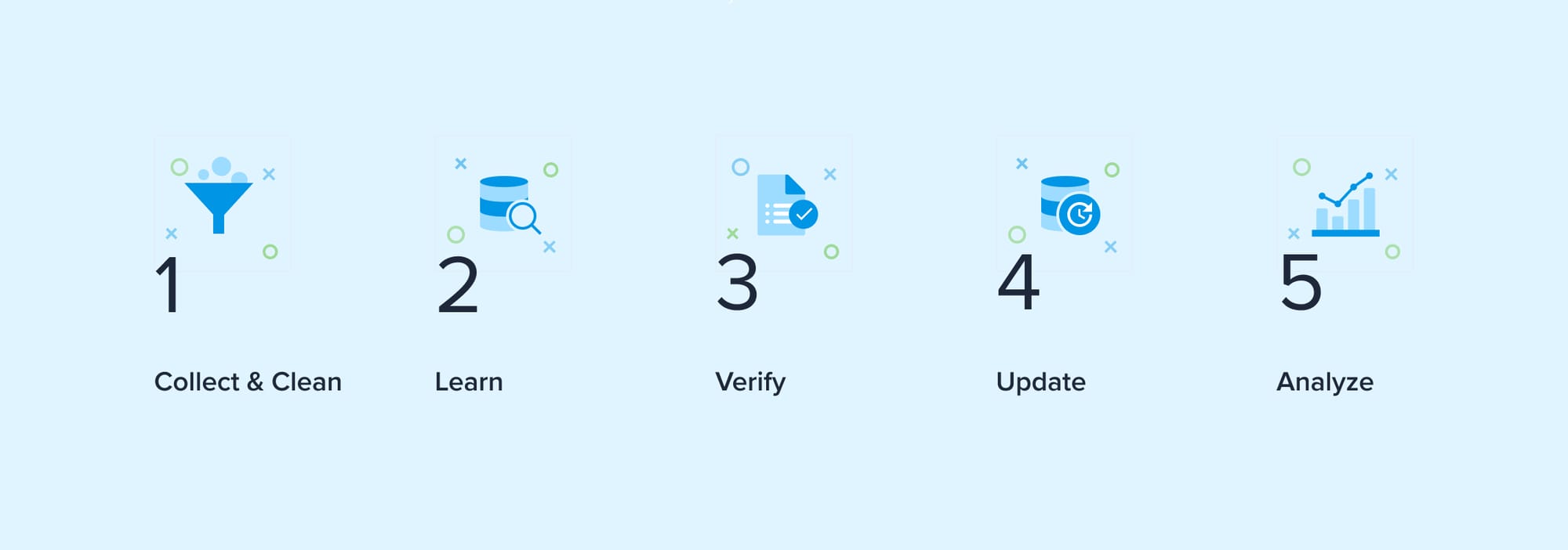 My IP ↗or
My IP ↗orIP address data is known to shapeshift at a rapid-fire pace. The challenge for IP address providers like IPinfo is to keep databases clean and accurate.
What’s at stake if we don’t keep up with IP information shifts? Governments, healthcare, cybersecurity, Fintech, and other industries can’t rely on this data.
In other words, IP data is only as useful as it is accurate. That’s why one of our highest priorities at IPinfo is to keep our proprietary database clean and accurate.
For simplification purposes, we’re going to describe our data-cleaning process as a step-by-step system. However, it’s important to note that our algorithms work more cyclically than linearly. For instance, if a piece of IP data makes it through the first three steps and gets flagged during the fourth, we send the information back through steps 2 and 3 for reassessment.
Here’s what goes on behind the scenes at IPinfo to ensure data quality.
1. Collect & Clean
First of all, IPinfo collects insights from a variety of sources. These include ISPs, geofeeds, and other proprietary sources.
Without boring you with too much detail, here’s what we’ve discovered. Relying on one or two sources for IP address insights, such as Maxmind, is not the best way to ensure accuracy for our users.
Much like financial investment strategies rely on diversified portfolios, IP address accuracy depends on diversified data streams. That’s why we gather information from many sources, use our algorithms to weigh data quality, and select the most sensible option to produce clean insights.
The result? IP address data from IPinfo is the most up-to-date information available.
2. Learn
We’ve also developed unique algorithms to improve our data quality through automation. As we input more and more information, these algorithms learn how to separate the good data from the bad.
Our objective is to optimize for accuracy and coverage (of all IPs), learning with more and more information over time to separate good from bad data. With our domain knowledge to guide this process, our algorithms provide insights customers can rely on. - William Leung, Data Expert at IPinfo
So not only are we gradually improving our databases, our algorithms improve themselves over time to ensure that our customers have insights they can rely on.
3. Verify
Once our algorithms sort incoming information, our data team double-checks the good data to make sure it meets our quality standards. We run a variety of automatic tests and conduct manual investigations of reported issues to ensure our general data improves every month.
It’s important to note that not every IP address provider prioritizes data accuracy. For instance, some emphasize low prices at the expense of reliable data. As a result, many free sources end up distributing unvalidated information - information that may have been accurate last year or last month but is no longer reliable.
That being said, here are some of the things IPinfo’s team looks for in our verification process:
- Where did the information come from?
- When were these insights last updated?
- Is the data credible based on our other information?
- Do we have similar data from other reliable sources?
- What does our traceroute data say?
In short, our data accuracy isn’t an accident, and this verification step is an important facet of the reliable IP information we’re known for.
4. Update
At this point in the process, IPinfo’s algorithms and data engineers begin making adjustments to our database. In fact, we update this database every 24 hours to ensure that we have the most up-to-date IP information available anywhere.
Our top priority at IPinfo is to keep up with constantly changing IP addresses so customers can rely on this information for everything from threat intelligence to data enrichment. Plus, our infrastructure is such that our backend systems run predictably against traffic spikes, providing low-latency experiences for all of our users regardless of request volume.
To test this accuracy and reliability for yourself, here are a few free tools and resources to try before signing up for the free trial:
As mentioned, we also offer a limited-time free trial of all our features. But beyond that, we also provide up to 50,000 free geolocation lookups per month. In other words, we want our users to know the quality of data we offer before investing in our IP information.
5. Analyze
Our data cleanliness and accuracy doesn’t stop once we update our database. Our last step is to use our algorithms to analyze and observe trends to help us keep up with shifting IP address trends.
To do this, we compare our models and times to pinpoint any data conflicts. Then we look at our IP information with the eyes of customer relevance, making sure that it fits the needs of our users.
Again, while it’s helpful to describe our data-cleaning processes as a step-by-step process, in reality, our data accuracy is somewhat of an ongoing cycle. In other words, analysis is never the last step.
Rather, data-cleaning is an ongoing circle - a never-stopping machine - that keeps improving and analyzing data 24-7. If and when our algorithms flag data issues, we then return to steps 2-3-4 and reassess that information.
In short, our accurate IP address information isn’t an accident. We invest significant time and resources to ensure that we offer only the most reliable insights.
How accurate IP data affects industry-leading companies
Here are a few of the industries that benefit from this 5-step process.
Travel tech
Accurate IP address data helps travel tech companies conserve revenue. We’ve seen this information used in these ways to improve travel and booking experiences:
- Content localization
- Content customization
- Targeted advertising
- Fraud detection
For more information about travel tech uses of IP information, check out this recent article.
Suffice it to say, though, IP data accuracy affects revenue conservation and customer experiences for everything from booking platforms to airlines. And that’s just one of the many reasons we prioritize reliable data here at IPinfo.
Adtech
As Adtech continues to expand, we’ve observed some interesting applications of IP address information. Not the least of which is the future of IP data as a replacement for 3rd party cookie data collection.
In order to rely on this information for Adtech use cases, such as geotargeting and geofencing to lower cost per impression (CPI), these IP insights need to be as precise as possible. Yet another reason why IPinfo puts so much work into cleaning and verifying our database.
Data enrichment
Data enrichment, by its very nature, depends on accurate 3rd party data sources. In order to help companies gather better context and make informed decisions, our database must deliver reliable IP address insights.
It’s for these reasons that our data team updates and improves our database every day. For a real-life example of how our accuracy helps our users, here’s how Graylog uses our data to enrich customer insights.
Cybersecurity
Cybersecurity has never been a one-size-fits-all solution. To stay a step ahead of malicious traffic and develop reliable threat intelligence, IP address data needs to be accurate. Here’s what one of our cybersecurity customers had to say about our data quality:
IPInfo is absolutely essential to our business. The data is rock solid, the API is dead simple, and the price is unbeatable. I constantly recommend it to all of my friends in the industry. - Andrew Morris, Founder/CEO, GreyNoise
To read more about how GreyNoise uses IP address data to make categorizations and inferences, read their story here.
Game tech
Accurate IP address information also affects frictionless gameplay for GameTech. Good quality data helps developers improve these facets of online gaming:
- Limit users by geolocation
- Protect customer payments
- Limit content based on location
- Prevent fraud
- Improve fast, responsive features
But without accurate IP address information, game developers can’t optimize online gaming to its full capacity. That’s why IPinfo spends so much time collecting, verifying, and updating our data with the help of algorithms and our in-house data experts.
Account-based marketing
From market segmentation to automation, Account-Based Marketing (ABM) needs reliable firmographics and data enrichment to pinpoint high-level leads. As third-party cookies become obsolete in the coming years, accurate IP address data can help fill the data collection void.
However, pinpointing the right leads is directly tied to accurate data. And, you guessed it, this is yet another reason IPinfo prioritizes data quality.
Modern governments
We recently published an article about the role of IP address data for modern governments. Without going into too much detail, here are the ways this information is used to protect citizens:
- Cybersecurity and forensics
- Cyberwarfare
- Managing online assets
- Monitoring government employee access
- Online teaching and training
IPinfo is privileged to work with governments on every continent across the globe. And one of the main reasons they trust us as their data source is the priority we put on IP data accuracy.
Fintech
Fintech faces several challenges that IP address data helps solve. Not the least of which is ensuring customer security while reaching a global customer base. In fact, Transfergo, one of our customers, addressed some of these very issues by using IPinfo’s accurate data.
IPinfo's VPN detection proved to be 100% accurate in their tests. The other competitors, at any level, proved to be wildly inaccurate. That's how we knew their geolocation capabilities would meet our needs. - Olegas Murasko, VP Engineering at TransferGo
In other words, Fintech companies need accurate IP address data to implement their use cases.
Ecommerce
As Ecommerce companies expand their online markets, IP address data helps improve personalized experiences at scale. Additionally, this information is used to customize content (such as discounts or other offers), communicate shipping policies based on location, and prevent merchant losses due to credit card fraud.
But if these companies use outdated IP address databases, Ecommerce customers may have poor experiences - a major reason buyers never return to a brand again. This is why IPinfo takes such a strong stance on IP address accuracy.
Journalism and investigations
For investigators and journalists, IP data tells stories that can’t be found anywhere else. Here are a few ways IPinfo’s data is used for these purposes:
- Protect at-risk groups
- Research political strategies
- Investigate web censoring
For more information about how accurate IP insights improve journalism, check out our recent article.
All this to say, IP address accuracy affects many different industries and use cases. And while the above list isn’t exhaustive (for instance, we didn’t even mention Health tech or Digital media), it’s enough to point out why IPinfo takes such a strong stance on data quality.
IPinfo isn’t the typical IP address provider. We specialize in gathering accurate IP address data that helps users develop industry-leading use cases.Discover more ways to use our data! Connect with a data expert today!
About the author

Internet Data Expert
